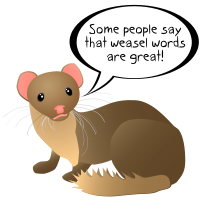|
... some people say, it is believed, many are of
the opinion, most feel, experts declare, it is often reported, it is
widely thought, research has shown, science says, it was proven ...
|
Phrases such as these present the appearance of support for
statements but can deny the reader the opportunity to assess the source
of the viewpoint. They are referred to as "weasel
words" by Wikipedia contributors. They can pad out sentences
without adding any useful information and may disguise a biased view.
Claims about what people say, think, feel, or believe, and what has
been shown, demonstrated, or proven should be clearly attributed.[3]
